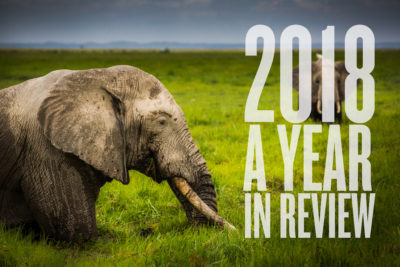
This year, with your support, societies are moving away from wildlife consumption. Rhino horn prices have declined by two-thirds and poaching levels in South Africa decreased by 25% in the first part of the year. Since China’s world-leading ban on domestic ivory sales was announced, the price of ivory in China has dropped by 70% and seizures of ivory entering the country fell by 80%.
With its massive population, many in China still do not know about the ivory ban so we are now focusing our efforts in second-tier cities and on reaching Chinese tourists in Vietnam and Laos. Meanwhile, in Vietnam, and Thailand, sales bans are in various stages of implementation. We continue working to persuade Japan to join the world community in ending the ivory trade.
In 2018, we launched new partnerships with Universal’s Jurassic World: Fallen Kingdom featuring actress Bryce Dallas Howard on rhinos, Marvel’s Black Panther with actress Danai Gurira on rhinos, and DreamWorks Animation’s Kung Fu Panda on elephants, rhinos, tigers, lions, and pangolins. These video PSAs, billboards and social media messages have been distributed in more than six languages across Asia, Africa, and the United States.
Pangolins, the scaly anteater recognized as the most heavily trafficked wild mammal in the world, are in demand for their scales and meat. Last year, Jackie Chan lent his martial arts skills to a campaign that was seen by millions in China and beyond. This year, we have produced new PSAs with movie star Angelababy and pop star Jay Chou to raise awareness. We also hosted a conference in Hong Kong SAR, where traditional medicine experts informed the world that there are more than 100 alternative therapies to pangolin scales that have similar medicinal qualities. The conference also highlighted the impracticality of trying to breed pangolins commercially. Only a few dozen have been bred worldwide to date.
Meanwhile, sea turtles are illegally killed for their eggs, meat, and shells. They also face threats from ocean pollution and coastal development. So we’ve launched both marine protection programs in Africa, South America, and China as well as a new sea turtle demand reduction campaign in Asia.
We are winning some important battles, but there is more to be done. The illegal trade in wildlife undermines security and economic development in affected countries while providing profits for criminal syndicates and corrupt officials. To help address these problems, we expanded our “Poaching Steals From Us All” campaign in Tanzania, Kenya, South Africa, and Uganda while we began preparing to launch in Mozambique, Zimbabwe, and Gabon. The campaign features prominent African entertainers and sports stars to build public support and political will to tackle the poaching kingpins.
To continue our legacy of important work, an anonymous donor will match all donations up to $25,000 until 11:59 PST on December 31st, meaning your gift will have twice the impact.
Stay in touch and get the latest WildAid updates.
SIGN UPAbout WildAid
WildAid is a non-profit organization with a mission to protect wildlife from illegal trade and other imminent threats. While most wildlife conservation groups focus on protecting animals from poaching, WildAid primarily works to reduce global consumption of wildlife products such as elephant ivory, rhino horn and shark fin soup. With an unrivaled portfolio of celebrity ambassadors and a global network of media partners, WildAid leverages more than $308 million in annual pro-bono media support with a simple message: When the Buying Stops, the Killing Can Too.
Journalists on deadline may email communications@wildaid.org